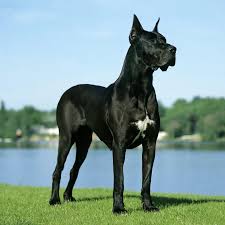
Great Dane
Conditions of detention
Great Danes are adaptable but prefer living in homes with ample space due to their large size. They can live in apartments if given enough exercise, but a house with a large yard is ideal.
Useful Fact: Despite their size, Great Danes are often couch potatoes indoors and require soft, spacious bedding to support their joints.
Nutrition and diet
A balanced diet is crucial for Great Danes, particularly because they grow rapidly and need proper nutrition to support their joints and bones. High-quality dog food designed for large breeds is recommended.
Useful Fact: To prevent bloat, a common issue in large breeds, it’s better to feed Great Danes multiple small meals throughout the day rather than one large meal.
Health
Great Danes are generally healthy but are prone to certain conditions such as hip dysplasia, heart disease, and bloat (gastric torsion).
Useful Fact: Regular veterinary check-ups and preventive care, including joint supplements and regular heart screenings, are essential to manage potential health issues.
Grooming and care
Great Danes have a short, smooth coat that is easy to care for. Regular brushing will help remove loose hair and keep their coat shiny.
Useful Fact: Great Danes can be sensitive to cold weather due to their short coat, so a dog sweater or jacket is advisable in colder climates.
Education and training
Intelligent and eager to please, Great Danes respond well to positive reinforcement training methods. Early socialization and training are crucial to manage their large size.
Useful Fact: Consistent training from a young age helps ensure that a full-grown Great Dane is well-behaved and manageable.
Toys and entertainment
Sturdy toys are necessary for Great Danes due to their powerful jaws. Chew toys, large balls, and interactive toys can keep them engaged.
Useful Fact: Mental stimulation is just as important as physical exercise for Great Danes, so puzzle toys and training games are beneficial.
Safety
Given their size, Great Danes need sturdy collars and leashes. They should always be supervised when interacting with smaller pets and children to prevent accidental injuries.
Useful Fact: Due to their height, Great Danes can easily reach countertops and tables, so be mindful of food and objects left within their reach.
Accessories
Durable collars, leashes, and harnesses are essential for handling their size. Additionally, large, comfortable beds and elevated feeders are beneficial for their joint health.
Useful Fact: Elevated feeders can help reduce the risk of bloat by promoting a more natural eating posture.
Socialization
Early socialization with other dogs, animals, and people is crucial to develop a well-rounded temperament. Great Danes are typically friendly and enjoy being part of the family.
Useful Fact: Regular playdates and exposure to different environments can help prevent shyness or aggression.
Travel and Transportation
Great Danes generally travel well, but due to their size, a spacious vehicle is necessary. Accustom them to car rides from a young age for a stress-free travel experience.
Useful Fact: Using a large, secure crate or a dog seat belt can enhance safety during travel.
Behavior and psychology
Known for their gentle and affectionate nature, Great Danes are often called “gentle giants.” They require companionship and can suffer from separation anxiety if left alone for extended periods.
Useful Fact: Regular exercise, mental stimulation, and positive social interactions are key to preventing boredom and anxiety-related behaviors.
Legal aspects
Owning a Great Dane may be subject to local pet laws and regulations, including breed-specific legislation, licensing, and leash laws.
Useful Fact: Familiarize yourself with local regulations and ensure your Great Dane is properly licensed and identified.


